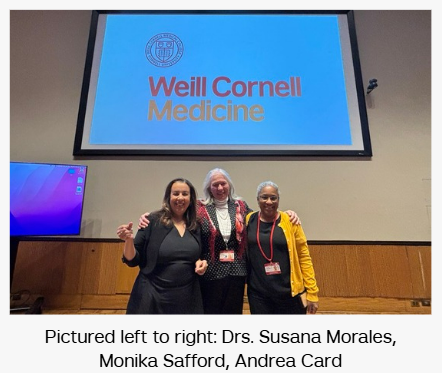
Although only 5% of active physicians are African American and 5.8% are Latino (2019 AAMC Diversity in Medicine report), Weill Cornell Medicine is dedicating time, energy and empathy to build inclusive environments. In recognition of Weill Cornell Medicine’s recent Diversity Week, the Weill Department of Medicine’s Grand Rounds on April 9, 2025 focused on the extraordinary work of the Cornell Center for Health Equity (CCHEq) and the Diversity Center of Excellence (DCOE), both partially based in the Division of General Internal Medicine.
Dr. Monika Safford, Chief of the Division of General Internal Medicine and the 2023 recipient of the Jessica M. and Natan Bibliowicz Award for Excellence in Mentoring Women Faculty, led a panel discussion with Drs. Susana Morales, Andrea Card and Anyanate Gwendolyne Jack on CCHEq’s impact since its founding in 2018. Comprised of more than 400 faculty, students and community partners, the Center pursues a fivefold mission: translating health equity research into practice and policy; training diverse investigators; educating communities; engaging underserved populations and generating knowledge.
CCHEq has positioned Weill Cornell Medicine at the forefront of national and global health equity research. It leads and collaborates on major NIH-funded studies such as REGARDS-MI, the Haiti CVD Cohort, the COMMUNITY Center with Columbia, and the NY CHAMP Center.
Training the next generation of equity-focused researchers, the Cornell-Hunter Health Equity Research Fellowship develops clinician-investigators and PhD candidates through research experience. Supported by HRSA T32 and other resources, fellows explore topics such as chronic illness disparities and community-based care, preparing them to lead in both academic and clinical environments.
As for the DCOE, Dr. Susana Morales, Associate Professor of Clinical Medicine in the Division of General Internal Medicine, Director of the DCOE, and Co-Director of the CCHEq Education Core, highlighted DCOE’s achievements. The DCOE, funded in the past by HRSA and philanthropy, was founded to promote diversity in health care fields and to enhance health equity. The Diversity Mentoring Cascade enhances mentoring for diverse students with team-based mentoring. The DCOE also works with student groups including the Student National Medical Association (SNMA) and the Latino Medical Student Association (LMSA).
A deeper look at pipeline efforts came from Dr. Andrea Card, Assistant Professor of Clinical Medicine in the Division of General Internal Medicine and Faculty Lead of the DCOE’s Premedical Initiatives. This initiative develops programs that provide structured mentorship and academic guidance to pre-med students through partnerships with six local universities. The Careers in Medicine Enhancement Program (CMEP), a key program in the Premedical Initiatives efforts and now in its fifth cohort year, offers a virtual spring experience for college students and recent graduates, focusing on career development, health equity training and community-based projects.
Faculty development is also a key pillar of equity work. Dr. Anyanate Gwendolyne Jack, Assistant Professor of Clinical Medicine and Director of the Scholars in Health Equity Program recently received the Bruce Laine Ballard, MD Award for Excellence in Mentorship. Dr. Jack shared how the DCOE’s Faculty Scholars in Health Equity Program provides individualized mentorship to educators across specialties from pediatrics to oncology. Now in its fifth cohort, the program is empowering faculty to integrate equity into curricula and clinical leadership, cultivating educators who champion inclusive practices and culturally responsive care.
Reflecting on the pandemic, both CCHEq and the DCOE responded with initiatives like the COVID-19 STEM Community Education and Empowerment Internship Program to address vaccine equity and health misinformation.
As we reflect on Diversity Week, the work of CCHEq and the DCOE serves as a powerful reminder that achieving health equity is an ongoing journey. Through mentorship, education, research and community engagement, these programs are laying the foundation for a compassionate and inclusive healthcare system—one where everyone has a chance to thrive.
Related Links: Awards Recognize Diversity Champions Across Weill Cornell Medicine

